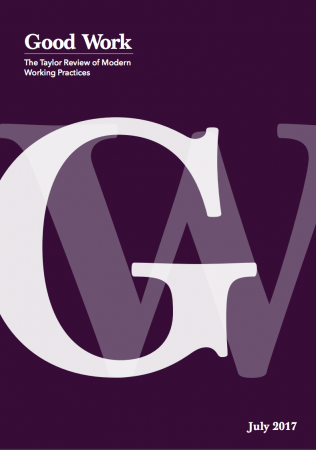Matthew Taylor delivered his Review of Modern Working Practices on Tuesday – but critics have pointed to its failure to explicitly mention co-ops and employee-owned models of business.
The review – commissioned by the Conservative government from Tony Blair’s former advisor to look at employment issues such as low pay and the gig economy – makes a series of recommendations for policy makers.
- It wants all forms of work to be treated equally – in terms of tax, rights, and regulation
- It recognises the value of platform working for those who need it, with platform workers designated as “dependent contractors” whi should be treated fairly, with flexibility required of employers as well as workers
- The law should be framed to encourage employers to behave properly and for all workers to know and exercise their rights
- The best way to achieve better work is not national regulation but responsible corporate governance, good management and strong employment relations within the organisation
- Everyone should have “realistically attainable ways to strengthen their future work prospects”
- There should be a “more proactive approach to workplace health”
- The National Living Wage is “a powerful tool to raise the financial base line of low paid workers” which should be backed by strategies engaging employers, employees and stakeholders to ensure that people are not stuck at the minimum rate.

Working Practices was published on 11 July 2017
But critics, including union leaders and the Labour Party, say the report, which insists: “our flexible approach – what the review calls ‘the British way’ – works”, is not bold enough.
And although it includes a section on ‘WorkerTech’ solutions – online platforms for employees to pool risks and resources, with the proposal that the government put a “Catalyst’ in place to stimulate more of these – the review makes no explicit mention of co-ops or employee ownership.
Claire McCarthy, general secretary of the Co-operative Party, said: “I’m sure the whole co-operative movement will agree with the aim at the heart of the review that we want an economy which delivers good work for all. The recognition that responsible businesses create good jobs and the importance of corporate governance and employee engagement within that is also welcome.”
But she added: “Given this, it was a little disappointing that the review made no concrete proposals in this area and indeed did not acknowledge that different business forms including employee ownership and worker co-ops have this hardwired in.

“In addition, the proposed ‘Catalyst’ to stimulate the development of new models of collective insurance should not focus exclusively on technology-based solutions and instead should also look at promoting co-operative solutions like bread funds that work in other countries – whether delivered via platforms or by more traditional means.”
Peter Holbrook, chief executive of Social Enterprise UK, also wished the review had gone further.
He said: “Few social entrepreneurs would disagree with Matthew Taylor’s ambition that ‘all work…should be fair and decent with realistic scope for development and fulfilment’.
“Yet the report is far too quick to dismiss the role national regulation could and should play in delivering this. The proposal for ‘dependent contractor’ status in addressing the more exploitative practices of some platform-based companies feels more like an accommodation of unacceptable corporate behaviour than a challenge to it.”
And he said the review should have paid more attention to “the employability gap” for BAME groups and people with disabilities, and criticised it for not acknowledging the role that social enterprises in this area.

He added: “Social enterprises and their brothers and sisters in the co-operative movement offer a model of doing business that is intrinsically people centred – leading the way in terms of both pay and diversity. The pay ratio between CEOs and the lowest paid in a social enterprise is on average just 3.6:1 (compared to 150:1 at FTSE 100 companies); 31% have BAME directors and 40% have directors with a disability. The majority also pay the higher living wage as set by the Living Wage Foundation.
“Perhaps the so-called “sharing economy” could look to this wider social economy for inspiration on how the need to make profit can be balanced with social responsibility.”
And he warned: “The Taylor Review is the most comprehensive report yet on the rapidly changing nature of work. We suspect that the pace of change and the gulf between those with secure jobs and those without will mean that it will not be the last report on the topic.”
Simon Parkinson, CEO and principal of the Co-operative College, said: “We welcome the report as another piece of research into the future of work, though feel it may have benefited from specifying existing approaches that could provide answers to the issues, particular worker co-ops.
“Worker co-ops are well understood here in the UK and internationally as a proven way to for workers to protect their own rights and to strengthen health and wellbeing through a more engaged workplace. They also offer many individuals faced with increasingly precarious work a good balance between flexibility and control.”

In his analysis of the review, Co-operatives UK policy officer James Wright welcomed some of its ideas and said it was “is at its best where it identifies what workers can do for themselves, often through modern forms of co-operation and organising”.
But he he also pointed to omissions, adding: “The review stresses the need for the self-employed to provide for periods of ill health and to plan retirement but stops short of mentioning many of the ways they can do that better by working together.”
Mr Wright said 2016’s Not Alone report, sponsored by Co-operatives UK, the Wales Co-operative Centre and Unity Trust Bank (with key contributions from the Co-operative College), had provided examples of how this could be done.
He added that the Taylor Review “also misses a trick by failing to recognise how flexible working can be a very good thing“ in improving flexible working arrangements.
“For example,” he wrote, “an increasing number of people in the tech sector prefer to collaborate and partner in networks, retaining freedom and flexibility but also building solidarity and working in teams.
Related: Not Alone report looks at co-operation for freelancers
“The review is weaker for failing to understand the key organisational tools for doing this, such as co-ops. Given the important contribution this type of work could make to boosting productivity, opportunity and wellbeing in a priority sector for the emergent Industrial Strategy, this is particularly disappointing.”
And he pointed to the review’s failure to mention worker co-ops in its section calling for better corporate governance and a more meaningful say for employees at work.
He added: “It is possible for a business to care about its employees, reward them fairly, invest in them and give them a voice without sharing ownership.
“But it’s also true co-operative ownership aligns profit, power and worker benefit in a business more seamlessly. We should not lose track of the massive boost to decent work to be gained from expanding worker ownership and control in the economy. Unfortunately worker ownership gets not a single mention.”
However, he said the review “has certainly moved conversations about the modern work in some potentially very fruitful directions” and contained promising detail for the co-op model, “if you know where to look”.
“What is vital, and is thankfully picked up in the review, is the need for more of this technology to be at the service of workers, in their hands,” added Mr Wright.
And he welcomed the section on WorkerTechs, in which the Taylor Review recommended: “Government should work with partners to create a Catalyst to stimulate the development of a range of WorkerTech models and platforms in the UK. This would allow new and emerging solutions to develop and grow, in a “sandbox environment” with a view to better supporting self-employed people.”
Mr Wright said: “We’d love to see this happen and are eager to work with our members to champion this particular recommendation in particular.”
He added: “Another very encouraging recommendation recognises that in amongst all the existing government interventions intended to help people transition to self-employment, more can be done to develop advice and support that gives them the greatest chance of succeeding.
“We made just this point in our submission to the Review, calling for a programme to help workers considering self-employment understand their co-op options and support them to adopt co-op approaches where they see an advantage in doing so.”
He said Co-operatives UK would call on the government to adopt this recommendation.
Deb Oxley, chief executive of the Employee Ownership Association, was also more welcoming.
She said: ““The EOA welcomes the review as it shines a light on the need to improve the quality of work for employees, and especially in terms of the environments in which that work is done.
“There is clearly a significant opportunity for employee ownership to contribute to the concept of ‘good work’, not least because the higher levels of employee engagement and representation support employees being able to have more influence over their work, take more active participation in decision making and to feel more valued.
“So in employee-owned businesses, all workers, regardless of their level or salary, are far more likely to feel that they are contributing, with purpose, which is a key motivator of higher levels of productivity, job satisfaction and retention.”

